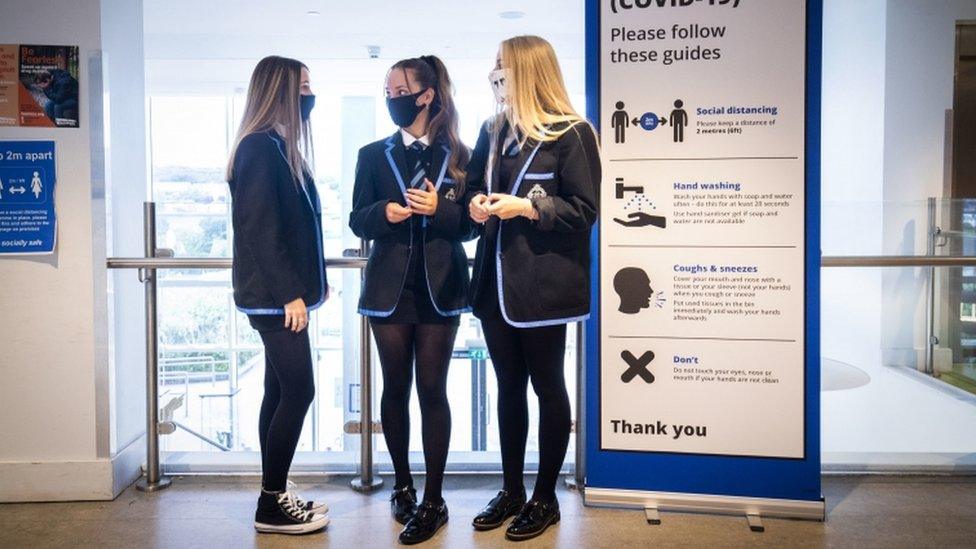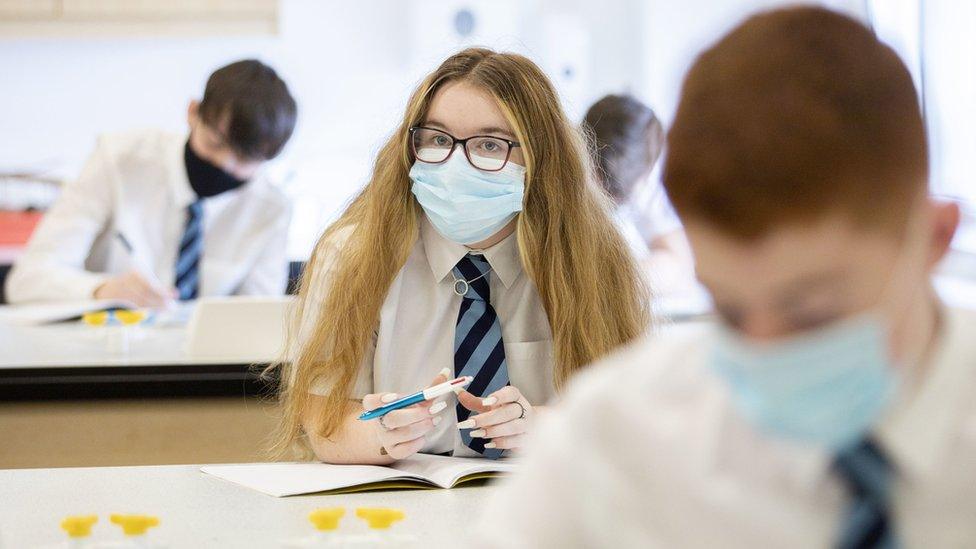Teachers say return to school for S1-3 'counterproductive'
- Published
- comments

All secondary pupils will be able to get some in-class time before the Easter holidays
The planned return for pupils in S1-S3 will involve less than two hours per week in school for some children.
Nicola Sturgeon announced last week that all secondary pupils in Scotland would have some in-school time from 15 March.
But teachers' groups have criticised the plan as "counterproductive" with workload disproportionate to benefits.
The first minister has said giving pupils even a small amount of time in school would have benefits.
The first to third year group is the last to return to school after lockdown.
Primaries one to three returned full time on 22 February, along with older pupils in S4 to S6 who had to complete work for qualifications.
Primaries four to seven will make a full return from Monday and S4 to S6 will be prioritised for face-to-face teaching.
Because schools currently have to stick to 2m distancing, capacity is greatly reduced for the rest of the pupils.
Individual plans
Schools have to create their own individual plans which are now being communicated to pupils and parents.
BBC Scotland has seen letters which show some pupils in the youngest years of secondary will be in school for as little as one class per week.
Some schools are in class for a half day, others have one full day and one independent school has pupils in for four-day blocks.
Teachers also have to keep remote learning going at the same time for those pupils not in school and some parents have been told to expect a much reduced online offering, as teachers will be taking classes.

Masks will now have to be worn by all pupils in secondary schools
Nicola Orr's son Connor is in S2 in Glasgow and has been invited to attend for two hours a week.
She said: "I have every empathy for the teachers as they are putting themselves at risk. However, Connor was quite excited about going back to school and then to be told it's for two hours of wellness and PE was disappointing."
Jennifer Miller's daughter goes to a different school in the city. She has been told she will receive one hour and 40 minutes of teaching time a week.
"She is saying it's pointless," she said. "She thinks it's not worth the risk of getting on trains and mixing with people when it's not even an actual class - just a wellbeing check-in."
Jim Thewliss from teachers' group School Leaders Scotland says schools did not know the change was coming until it was announced at Holyrood last week and that it had been an enormous logistical task.
He said: "You will be hard-pushed to find anyone within my professional association, even any teacher in Scotland, who thinks this is a good idea."
He added: "We understand and appreciate the support required for young people in their health and wellbeing. But this is not the way to do it.
"This is counterproductive in relation to the systems we have set up for remote learning and engaging people in their remote learning. This destroys a great deal of that and distracts school leadership teams from doing that to put a cobbled-together process in place for two weeks."
'Give young people some contact'
Teachers' union the EIS said the additional workload would potentially undermine preparation work for qualifications.
General secretary Larry Flanagan said: "The first minister has set out a desire for schools to develop a timetable model for the two weeks before Easter and then abandon it post Easter, with absolutely no cognisance of the workload pressures which that will create for already exhausted school staff, including teachers who will be focusing on providing additional support to students in the senior phase, currently working towards qualifications under a completely new assessment model."
"This additional workload will be wholly disproportionate to the benefit that it will bring for students."
The Scottish Conservatives' Holyrood leader Ruth Davidson read out parent concerns over the amount of school time during Tuesday's coronavirus update at the Scottish Parliament.
Nicola Sturgeon said that her intention was a full return after Easter holidays but that she wanted to give young people who had not been in school at all some contact, even if on a minimal basis.
National clinical director Prof Jason Leitch described the current hybrid phase as "tricky", acknowledging it was difficult to produce guidance for.
A Scottish government spokesman said: "It is for schools and councils to decide how to balance in-school learning based on local circumstances and the coronavirus safety guidelines.
"As every school building is different, what can be done safely in each school can only be decided locally. When not in school, secondary pupils will continue to benefit from high quality remote learning.
"Subject to progress in suppressing the virus, it is our clear expectation that all secondary school pupils will be back in school full-time following the Easter holidays."


- Published2 March 2021
